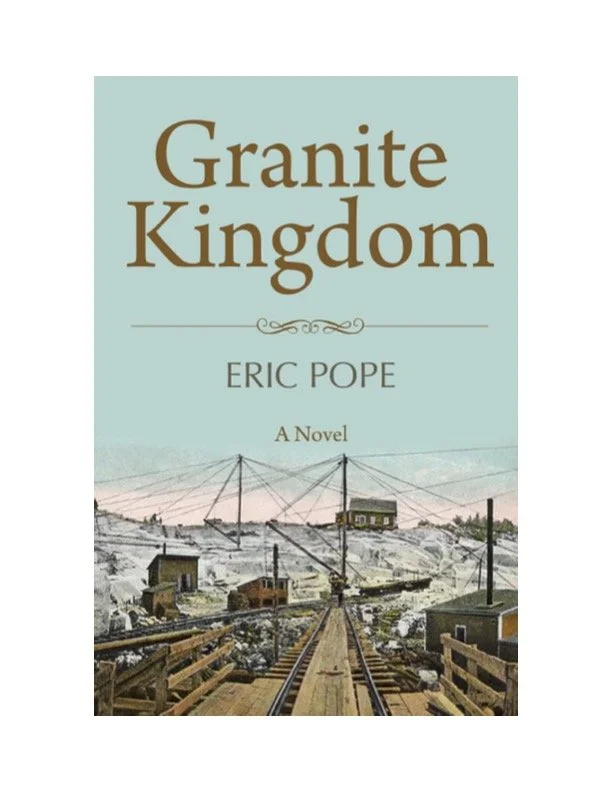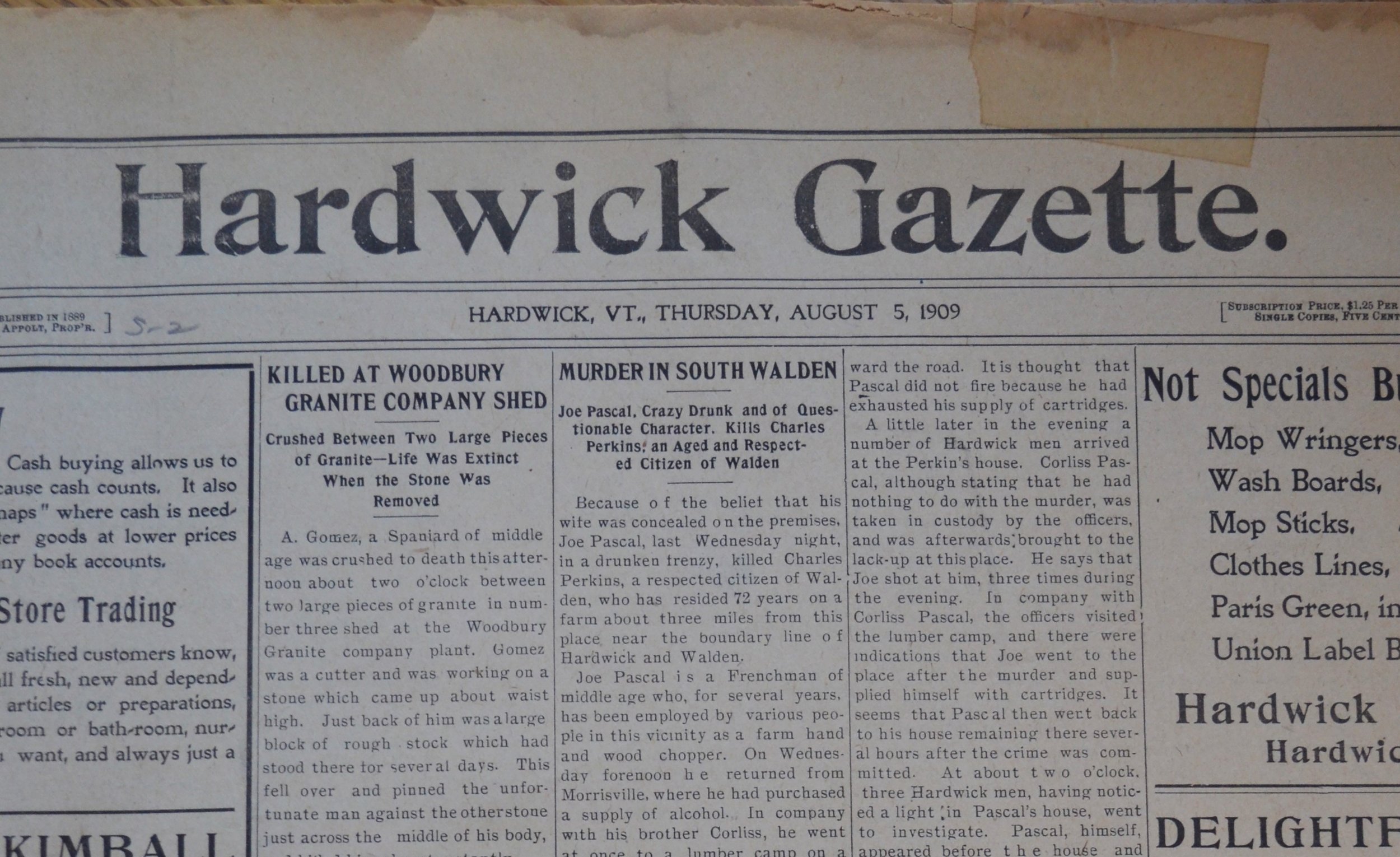Granite Kingdom
by Eric Pope
A lively and well-researched tale for fans of mysteries and American social history. —Kirkus Reviews
The Vermont granite industry provides the backdrop for this debut historical novel set in the early 20th century in a fictional small town.
In Granite Junction, two rival granite companies are fighting for prominence: one run by the disgruntled Ernest Wheeler and the other by society leader George Rutherford.
The story begins with a legal battle between the two men over Rutherford encroaching on Wheeler’s turf, all of which is reported by the Granite Junction Gazette. Young journalist Dan Strickland, the son of a stonemason, covers the story and the chain of events that follow. These include a suspected murder and business malpractice, pulling him further into the dark underbelly of the town despite his efforts to rise above his station.
Pope’s novel grapples with several interconnected themes, all inspired by the author’s ownership of a local paper and its archive in small-town Vermont. This makes for a nuanced portrayal of a community that relies on a particular industry and what happens when the business faces a period of uncertainty.
Most intriguing is the exploration of Strickland’s grappling with his identity and his attempts to ingratiate himself with the upper classes in Granite Junction (“If a farm boy like Ernest Wheeler could become the owner of a big company, then the son of a stonecutter could also achieve success”). This process begins with Strickland’s induction into the town’s Pedalers club, populated by his richer male peers. But it is ultimately symbolized by Strickland’s flickering romantic interests in school friend Molly O’Brien, the well-educated Camille Upton, and destitute widow Rosa Rosetti. Through these female characters and others, Pope also provides a convincing look at a cross section of women during the period, even if many of them are beholden to the men around them.
Each character provides a particular perspective, making for an ensemble feel to the novel that is sometimes more compelling than the mystery at the heart of the story.
A lively and well-researched tale for fans of mysteries and American social history. — Kirkus Reviews
REVIEWS
“In Granite Kingdom, Eric Pope deftly and vividly recreates a fascinating era in Vermont history and peoples it with characters who are just as ambitious and honorable—and greedy and underhanded—as their contemporaries today. A popping good read for any fan of historical fiction.”
—Evan Thomas, author of Ike’s Bluff and First: Sandra Day O’Connor
“Granite Kingdom is a compelling story about a small Vermont town grappling with the changes that swept many American communities in the early twentieth century. It is a welcome addition to Vermont’s granite story.”
—Scott McLaughlin, executive director of Vermont Granite Museum
“Granite Kingdom brings to life a whole era with its engaging cast of characters, its rich, accurate detail, and its knowledgeable presentation of the technology, the struggles of the workers and management, and the life of the community. It is a great read.”
—Scudder Parker, Vermont poet and author of Safe as Lightning
“I found Granite Kingdom engrossing. Eric Pope has taken a real place and a real time and created a compelling story without distorting either the shape of the place or its historical reality. Would that all writers of historical fiction had his commitment to historical accuracy.”
—Elizabeth H. Dow, PhD, president of the Hardwick, VT Historical Society
“Granite Kingdom is a page-turner about a one-stoplight bend in the road—a small Vermont village in 1910. From Main Street to side streets, the tale reverberates with labor strife, unfettered economic growth, exploitation of immigrants, racism, women’s suffrage, and conflict between agrarian and manufacturing societies.”
—Ross Connelly, former co-publisher of the Hardwick Gazette
“In Eric Pope’s Granite Kingdom, small-town New England in 1910 bristles with industrial conflict, class prejudice, and the petty insults of village life. Pope’s microcosmic recreation of American life before the Great War is a polished gem of historical fiction.”
—Arthur S. Brisbane, former editor of the Kansas City Star and former public editor of the New York Times
“Eric Pope’s historical novel captures an early 20th century drama as two granite tycoons battle over money and power. A smalltown newspaperman turns out to be a surprising hero in this captivating tale.”
—Margot Roosevelt, Los Angeles Times
Granite cutters in Hardwick, Vermont, around 1910.
Granite blocks for the Sherman Monument in Washington, DC, were produced in Hardwick, Vermont.
About ERIC
More than 40 years ago, my wife Karen and I bought The Hardwick Gazette, a weekly newspaper founded in 1889 in Vermont’s Northeast Kingdom. In the attic of the Gazette building on Main Street where we lived for three years were dusty bound volumes of the newspaper. I referred to these often for my column recounting events in the town’s past.
The most exciting stories came from the years preceding World War I, when Hardwick was the country’s largest producer of finished granite for construction. The Woodbury Granite Company furnished and set in place thousands of tons of stone for some of the grandest structures built during a golden age of American architecture, including the state capitols for Pennsylvania and Wisconsin, the city halls in Chicago and Cleveland, and dozens of churches, banks, mansions, post offices, and public monuments as far west as Idaho. Hardwick was a union town, and high wages attracted granite workers from Canada, the British Isles, Italy, Spain, and Finland, turning a traditional agricultural community into an American melting pot.
I have attempted to recapture the excitement of that era in this historical novel. Many of the events portrayed in this novel are taken from The Hardwick Gazette and other primary sources, but they have been altered and rearranged to tell a story. The characters portrayed in these pages are products of the author’s imagination despite any resemblance they may have to actual people. This is a work of fiction, and the village of Granite Junction portrayed in these pages is not a real place.
Other novels I have read about industry in that era portray the owners as rapacious and heartless capitalists and the workers as poorly paid and badly exploited. Management-labor relations are not so black and white in Granite Kingdom. The granite workers in this village were well paid, and the owners desired good labor relations even if they did not always look out for the workers’ best interests.
After we sold The Hardwick Gazette, I was a writer and editor for daily and weekly newspapers and magazines. I ended up in university media relations and publications at Lawrence Technological University outside Detroit.
Karen and I live in Grosse Pointe Park, Michigan. We have three children and five grandchildren. My second historical novel Macedonian Sun is scheduled for publication in 2023.
Wisconsin State Capitol
Order youR copy now
eBOOK
Click here to download the eBook from Rootstock Publishing.
Click here to download the eBook from Amazon.
Printed Copies
Hardcover and paperback copies of the book will be available for delivery after Nov. 29, 2022, at the following outlets:
The Galaxy Bookshop in Hardwick, VT
coming in 2023: Macedonian Sun
Macedonian Sun is a novel based on the life of Philip II of the ancient kingdom of Macedonia. Some historians have called him greater than his son, Alexander the Great. This historical novel presents the complete life of Philip from childhood through his rise to power and subsequent assassination.
When Philip was assassinated in 336 BCE, he was the most powerful man in Greek history. He was the first to unify the Greek city-states under his control and was about to launch the invasion of Persia that his son, Alexander the Great, would carry out. Philip won more battles than Caesar, was more cunning than Machiavelli, and had more wives than Henry VIII.
Little had been expected of Philip, the sixth son of a weak king of the Macedonians, who lived north of Mount Olympus and were considered barbarians by most Greeks. His family sacrificed him as a political hostage twice, and he was dismissed as an incorrigible womanizer. But as regent and later king, he built an unstoppable war machine and turned his kingdom into an empire. He suffered defeats and serious injuries on the battlefield but always found a way to recoup his losses.
Philip had a secret from his time as a hostage. When he got a slave girl pregnant, he freed her and his slave scribe to raise his illegitimate son in the safety of anonymity. These former slaves knew Philip better than anyone else as they watched his rise to power and sudden fall.
Even though he craved acceptance as a Greek, Philip repeatedly antagonized the Athenians with his deceptions. The great orator Demosthenes depicted him as a drunken lout. The Persians considered him a dangerous threat to be eliminated. His unification of the plains and highlands of Macedonia created a bitter division within his kingdom. His iron-willed mother Eurydice deemed him unworthy of the crown, and he alienated his fourth wife Olympias, who tried to turn their son Alexander against him. But his biggest problem turned out to be the feud between his favorite drinking companion Attalus and his first beloved boy Pausanias.






